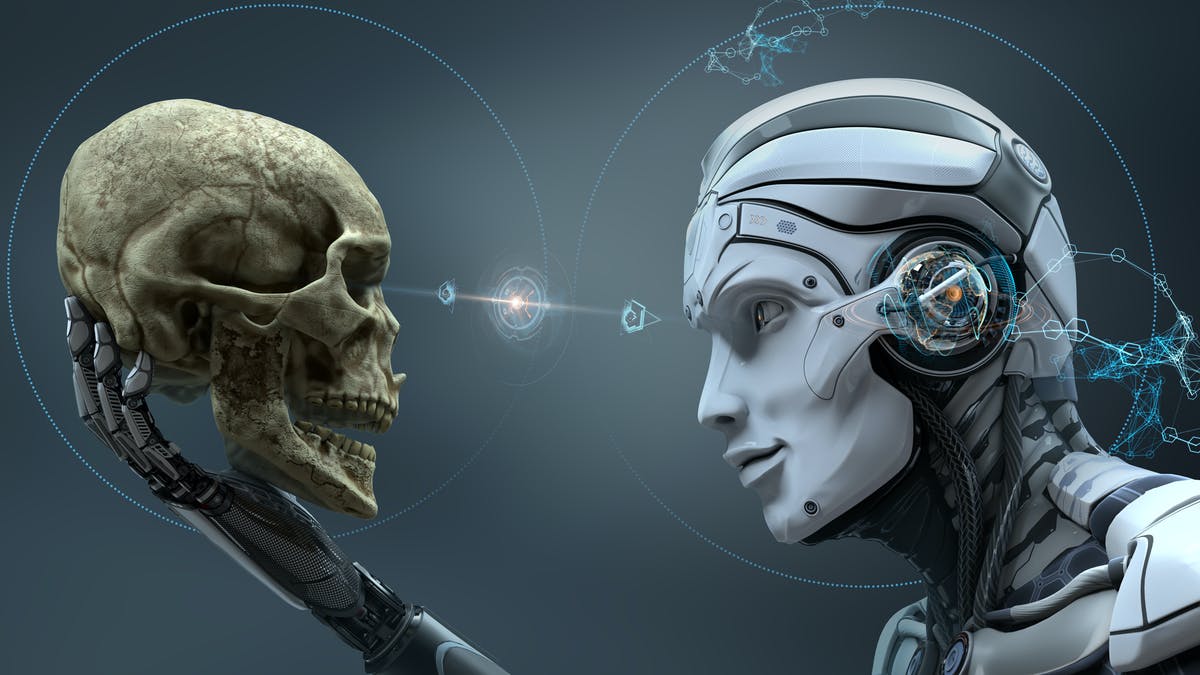
If you are an active member of the tech community, so you might know something about the term “AI”. It is like a hot cake of modern-day technology. From Medicine to Weather forecasting or recommendation of products on Amazon, AI is everywhere. It is not possible to imagine our daily lives without it. “AI is the new electricity,” said Professor Andrew Ng, American Computer Scientist, but besides all these advantages there are so many risks associated with it. Many famous people like Elon Musk, Stephen Hawking, and Yuval Noah Harari had already warned about its negative impact on Humanity. And in many sci-fi movies and novels you might have seen or read “AI will end humans. One day they will become more intelligent than humans and make Homo sapiens their slaves.” Will this happen? Really. Let’s examine.
Modern-day AI is getting smarter day by day. New advances are coming day by day. And it sometimes makes us feel fearful. The backbone of modern AI is particularly Deep Learning techniques that are based on Neural Networks, which are inspired by biological neurons. And their working mechanism is really simple you just have to give the inputs to it and it will produce some outputs. The loss function—the guide—appreciates the network when the predicted output is analogous to what we wanted but punishes when not. As same as we do with children—by appreciating them when they do something desirable to us, otherwise we punish them. And as children transform their behavior on the feedback from their loss function—guardians—the model also does the same but with the help of an algorithm—the backpropagation algorithm.
But do you know that modern AI is not so modern? Its history goes to the first millennium BCE when Indian, Chinese, and Greek philosophers started to develop a formal method of deduction. And further developed by philosophers like Aristotle, Euclid, and al-Khwarizmi.
During the 17th century, mathematicians and philosophers like Leibniz, Rene Descartes, and Thomas Hobbes turned their thoughts towards the systematic organization of rational thoughts like algebra and geometry. Leibniz thought of an idea about the universal language of reasoning that will put an end to argumentations by reducing arguments to mere calculations.
The real boom happens in the 20th century, in which computers took their real shape. In just starting Gödel provided the most important theorem on mathematical logic. In the 1930s, Turing and Church provided their thesis: any mechanical device can process out mathematical deductions and logic by just shuffling 0s and 1s. And then the idea of the Turing machine by Alan Turing provided many strong foundations for the existence of computers. But the term AI is not officially recognized yet, in the 1950s when pioneers of different fields—mathematics, psychology, engineering, and many more—joined their hands and laid the foundation of creating an artificial brain. Following that early 1950s saw discoveries in neurology—the brain is an organ made up of a network of many electrical units called neurons—advancements in information theory and cybernetics and publication of Turing’s theory of computation and landmark paper on Turing test pushed the idea of an artificial brain. Finally, in the Dartmouth Workshop of 1956—organized by Marvin Minsky, John McCarthy, and Claude Shannon, Nathan Rochester of IBM—the term Artificial Intelligence was coined by McCarthy. And this is the birth of AI, officially.
With rosiness the trains started to run towards their destination—the creation of fully intelligent machine—with a journey time of 20 years, the investment from many private and government agencies provided the necessary coal. The optimism of AI researchers sky-rocketed but they are unaware that their train has had to go from many seasons—one of them is winter.
The First winter spanned from 1974 to 1980, the exaggerated hopes fell down. The agencies stopped funding since there was no promising advancement. Many experts started criticizing the perceptron—an artificial model of neuron—inspired by neurons of mammals. But after 1980 there is notable progress in the field and the adoption of new methods by corporations changed their focus. In the shadows, work on perceptron was also going on. Again, cold winds started to blow, AI research got hit by their second winter. The expectations of the business community had fallen down since AI could not provide workable solutions for them.
There were many problems that hindered the progress of AI: not capable hardware, less data are some of them. But as time progressed the winter passed away and spring came with good news for the AI community. In 1997, the Deep Blue became the world’s first computer or robot to beat the chess world champion, Garry Kasparov. And the AI train became ready to run at its top speed. Today, AI is helping in the detection of diseases, in the discovery of new drugs and compounds, and making possible the dream of self-driving cars.
All of these advantages are the one side of the coin, the other side comes with new problems to humanity: loss of jobs, dangers to privacy, and the dark one—the end of humanity. In 2021, scientists developed xenobots that can reproduce themselves with the help of frog cells. And the ongoing debate does xenobots be considered living or not. This news is daring and signaling towards the manifestation of the dark problem.
The modern-day AI is specialized in specific fields—and some are in beating humans also. But ai is really intelligent? No, in reality, the AI of today is just a set of mathematical models which are trying to mimic human intelligence, but not truly intelligent. Consequently, they don’t have the main component which humans possess: consciousness. The subjective experience and a real understanding of everything. They cannot think on their own; they don’t have emotions; they cannot feel pain, pleasure, or anger as we feel. They can only mimic sadness, happiness, or can talk like us, based on the data they are getting for training. They can only learn from data but they really don’t possess all these qualities.
However, at present they don’t possess any of these qualities; but is it possible to create these qualities in the future? Most AI researchers believe that all these qualities will emerge automatically when the complexity of models comes as to of human brains. Isn’t it too vague? It is because we really don’t understand the terms like consciousness, feelings, awareness, and understanding—seems paradoxical. And how a three-pound jelly—brain— creates all these things is a mystery for today’s science. Some believe it is non-physical—some divine thing happens; some believe it is just a creation of interplay between neurons.
But Roger Penrose British mathematical-physicist does not believe any of them. In his 1989 book Emperors new mind, and 1995 book Shadows of the mind, he objected that human consciousness cannot be reduced just to the computations. Therefore, AI will never be intelligent truly. To reach his conclusions, he used Gödel’s incompleteness theorem: a “sufficiently powerful” formal system cannot consistently produce certain theorems which are isomorphic to true statements of number theory. But the human mind do so i.e., minds cannot be reduced to machines. Roger proposed that to produce consciousness we need a different or new science, which is not governed by today’s computers.
In conclusion, we can say that AI or present-day AI cannot be as intelligent as humans. And all the problems like job loss and privacy needed to be handled with care. To solve intermediate problems, experts—from different fields—from all around the world should join their hands and formulate some universal laws, which put restrictions on tech giants regarding the development of technologies and the decentralization of data. Ultimately paving the way for a healthier, safer, and AI-enriched society.
By Yashovardhan Shakya
Participate in Creative writing Contest & International Essay Contest and win fabulous prizes.


